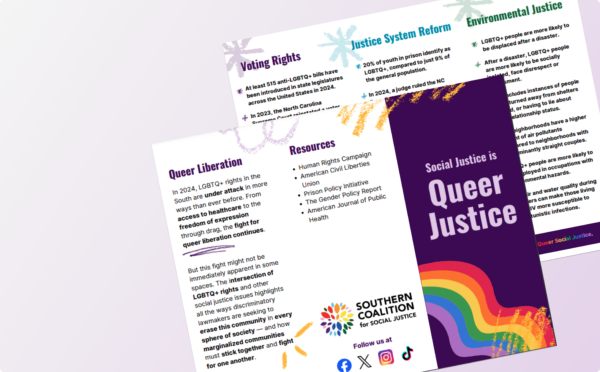In 2024, LGBTQ+ rights are under attack in more ways than ever before. From access to healthcare to the freedom of expression through drag, the fight for queer liberation continues. But this fight might not be immediately apparent in some spaces. The intersection of LGBTQ+ rights and other social justice issues highlights all the ways homophobic lawmakers are seeking to erase this community in every sphere of society — and how marginalized communities must stick together and fight for one another.
Below are research, guides and other information about the issues Southern LGBTQ+ communities face in voting rights, justice system reform, and environmental justice.
- At least 417 anti-LGBTQ bills have been introduced in state legislatures across the United States
- These attacks range from access to healthcare, educational policies, and free speech
- In 2023, the North Carolina Supreme Court reinstated a voter ID law, which both discriminates against voters of color and creates barriers for transgender and nonbinary voters
- 90% of LGBTQ+ Southerners live without nondiscrimination laws
- 11 anti-LGBTQ bills have been filed in the NC General Assembly in 2023, with topics ranging from restricting gender confirming care to in-school censorship to banning drag shows and Pride celebrations
- Only one-fifth (21%) of transgender people who have transitioned have been able to update all of their IDs
- 20% of youth in prison identify as LGBTQ, compared to just 9% of the general population
- GLB people are 2.25 times more likely to get arrested
- 1 in 5 trans people who have had police contact reported that they have been harassed by police
- North Carolina has no ban on the “Panic Defense,” a legal argument that states and victim’s sexual orientation or gender identity provoked or caused the defendant to murder them
- Disasters displaced about 3.4 million people in 2022, and about 4% of LGTBQ+ people evacuated compared with 1.2% of straight people
- Research has shown that after a disaster, LGBTQ people are more likely to be socially isolated and face disrespect or harassment in settings such as emergency shelters
- This includes instances of people being turned away from shelters and aid, or having to lie about their relationship status to access it
- LGBTQ+ communities are overrepresented in at-risk populations for whom a disaster is more likely to bring death, displacement, and other negative health, economic, and social impacts
- Those at risk include people who are homeless, impoverished, undocumented, incarcerated, and less likely to have access to health care
- Poor air and water quality during disasters can make those living with HIV more susceptible to opportunistic infections

